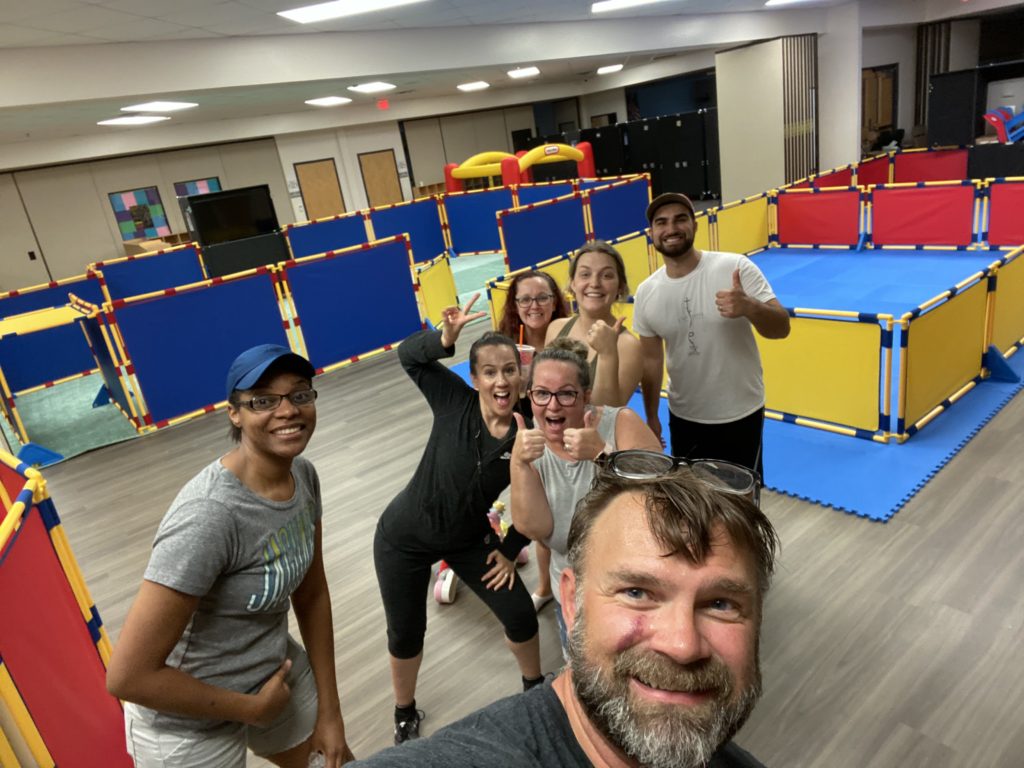Build an excited and empowered portable church team when you implement these 5 best practices.
As church planters and ministry leaders, your team is your greatest asset. Every aspect of your church environment is influenced by the leaders and teams heading up all that goes on in the church. Every portable church wants, and needs, an excited and empowered team because this kind of team is most effective in ministry.
Years of listening to feedback from churches of various cultures, denominations, and economic demographics have helped us deduce that the key to maintaining excitement and a sense of empowerment in a portable church team is to master the art of sharing the church’s vision.
This means that you should be able to transfer the vision of your church to your team effectively and inspire them to reach for excellence in their ministries. The result of being able to do this is a church filled with excited volunteers, led by empowered leaders.
Here are a few of the best practices we’ve found to help you achieve this kind of powerhouse team.

5 Best Ways to Build an Excited and Empowered Portable Church Team
1. Cast the vision of your church plant clearly and regularly
This point is covered extensively in churches because everybody is aware that without a vision, people perish (Prov. 29:18). It’s important to articulate a vision and make it compelling and clear. Churches engaged in God’s work have, by nature, very appealing visions!
Consequently, when a church has an exciting vision, its leaders and teams are excited; one inspires the other. In other words: Cast a clear and strong vision and a lot of the work will take care of itself.
Church leaders: Cast a clear and strong vision and a lot of the work will take care of itself. Share on X
2. Set up your volunteers for success with specific boundaries
You may be so excited about your church’s vision that you want to have a hand in every ministry, causing you to be spread too thin and too wide. There needs to come a time where you pass responsibilities over to other leaders and volunteers.
And when this moment comes, you need to be very clear that you are officially handing the responsibility over to someone else. A moment like this may sound like, “This is your project now. You care more about this project than I do and you are more than ready to take it over.”
This step is very important but it is one that many leaders forget, ignore, or fail at achieving thoroughly. In addition to clearly handing it over, it’s crucial that you clearly let go. Don’t overstep the boundary and try to control or micromanage what you have already handed over because you will destroy the sense of ownership that you originally cultivated.
Of course, it is important to establish mechanisms of accountability in your team, but holding to these won’t violate boundaries.
Need help training leaders? We’ve got you covered: How To Effectively Train Your Volunteer Teams

3. Keep your portable church team encouraged by providing resources
Always provide the resources that are necessary for individuals, or teams, to get the job done well. You want your leaders and volunteers to excel in what they do, rather than failing and blaming themselves.
What this involves is making sure that you provide adequate training, equipment, time, and money. And, sometimes to do a job correctly, people may need access to key people.
If need be, you can offer to help but the key would be to make it clear that you are not in charge. Let those involved know that you are only momentarily stepping into a role to lend a helping hand and then all authority goes back to the person responsible for that area.
This step is most important when the person you have handed over to has only recently taken over the reins. They are still building confidence in their new role and the risk of discouragement is high.
Free resources: 10 Books Church Planters Should Download Today
4. Do not make failure taboo: Allow failure
Perfectionists seldom lead empowered teams.
Read that again and let its meaning sink in.
Do you see how important it is that failure is an accepted part of the process when it comes to running a church? If you are leading as a perfectionist, it is likely that you are too involved in all processes and go to extreme lengths to avoid anyone making mistakes.
We must accept that failure is part of the process and even expect it. The way that you deal with failures will affect a person’s sense of ownership over their area of responsibility. Avoiding failure should not be more important than healthy delegation.

5. Ensure your portable church team enjoys their success
Working with a group of people who care as much as you do about realizing your church’s vision is incredibly gratifying. And times should be created for celebrating and enjoying the good work that your team does.
Schedule small events where you gather your leaders and teams to do something fun together. This will tighten your bonds and also communicate the message that you value each person and the effort they put into their role.
Want to really get into team encouragement? We’ve seen leaders set goals and give points for teams to earn events, like a group breakfast or a basket of gift cards. Speaking of, an individual gift card of $10 to your local coffee shop is a boost for any volunteer. Who doesn’t love to indulge when it’s been a well-earned gift?
Stay organized: 10 Smart Check-In Solutions for Portable Churches
AN EMPOWERED PORTABLE CHURCH TEAM WILL MULTIPLY THE VISION
If you take a close look at the points above, you’ll see that they revolve around respecting the people who you work alongside. It’s all about trusting in other peoples’ abilities and expertise and this takes a lot of handing over and letting God use His people to do great things. You are great and have wonderful gifts to share, and so do others. And when you can share the work, you also share the excitement.
Learn more about managing your volunteers when you read 10 Tips for Keeping Your Volunteers Engaged.
































































